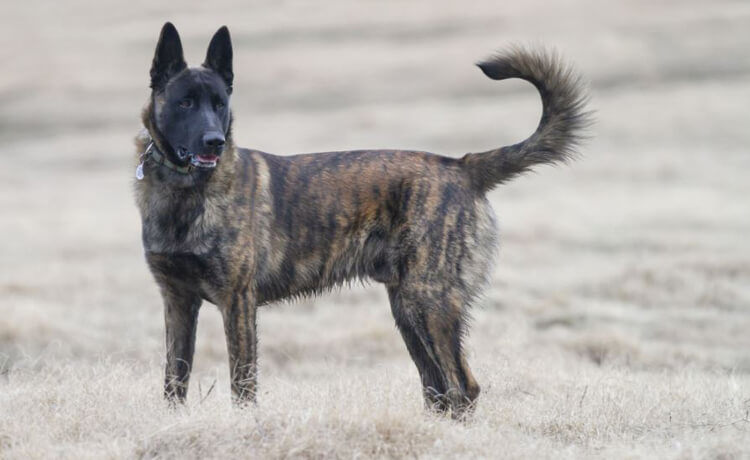
Dutch Shepherd
The Dutch Shepherd is a highly versatile and intelligent herding breed originating from the Netherlands. Known for their agility, loyalty, and trainability, these dogs excel in a variety of roles, including herding, police work, and being loving companions. Their striking brindle coats and sharp intellect make them a standout among working breeds.
Breed Overview
- Origin:Netherlands
- Height:21–25 inches
- Weight:40–75 pounds
- Lifespan:11–14 years
- Coat Type:Three varieties: short, long, or rough-haired
- Colors:Brindle, with shades ranging from gold to silver
- Temperament:Intelligent, loyal, energetic, versatile
- Purpose:Herding, protection, companionship
History and Origin
The Dutch Shepherd dates back to the 1800s, bred by Dutch farmers to herd livestock, guard farms, and serve as an all-purpose working dog. As agricultural practices modernized, the breed adapted to other roles, including police work, search and rescue, and service dog duties.
Despite its utility and versatility, the breed remains relatively rare outside its homeland. Dedicated enthusiasts have worked to preserve the Dutch Shepherd's remarkable abilities and unique traits.
Essentials for Your Newly Adopted Pet
Welcoming a shelter pet into your life is a beautiful journey. Here are some handpicked items to help your new friend feel safe, loved, and right at home:
Physical Characteristics
The Dutch Shepherd is a medium to large breed, athletic and balanced in appearance.
- Head:Proportional and wedge-shaped, with an intelligent expression.
- Ears:Erect and pointed, emphasizing their alertness.
- Eyes:Almond-shaped, dark, and full of expression.
- Body:Muscular and well-proportioned, built for endurance and agility.
-
Coat:
- Short-Haired:Dense and close-lying.
- Long-Haired:Straight and well-textured.
- Rough-Haired:Wavy and harsh to the touch.
- Tail:Medium length, carried naturally with slight curvature.
Temperament and Personality
The Dutch Shepherd is a highly intelligent and adaptable breed, known for its balanced temperament and eagerness to work.
- Loyal and Protective:Devoted to their families and excellent at guarding.
- Intelligent and Trainable:Quick learners that excel in various training disciplines.
- Energetic and Playful:Requires plenty of physical and mental stimulation.
- Social and Friendly:Generally good with children and other pets when properly socialized.
- Work-Oriented:Thrives in active households or with jobs that challenge their abilities.
Living with a Dutch Shepherd
The Dutch Shepherd is best suited to active families or individuals who can provide ample exercise and engagement.
Space Needs
They adapt well to both homes with large yards and apartments if given adequate daily exercise.
Exercise Requirements
This breed needs at least 1–2 hours of daily physical activity, including walks, runs, or vigorous play. They also benefit from activities like obedience training, agility courses, or herding tasks.
Training and Socialization
Dutch Shepherds are highly intelligent and eager to please, making them a joy to train. Positive reinforcement and consistent training help them reach their potential. Early socialization ensures they are well-mannered and confident in various situations.
Grooming: Low Maintenance with Seasonal Shedding
The Dutch Shepherd’s grooming needs depend on the coat variety.
-
Brushing:
- Short-haired: Weekly brushing.
- Long-haired: Twice a week to prevent tangles.
- Rough-haired: Occasional brushing and hand-stripping as needed.
- Bathing:Only when necessary to maintain coat health.
- Shedding:Seasonal shedding is common; increase brushing during these times.
- Nail Care:Trim nails regularly to prevent overgrowth.
- Dental Hygiene:Brush teeth several times a week to maintain oral health.
- Ear Cleaning:Check and clean their ears regularly to prevent infections.
Health and Common Issues
Dutch Shepherds are generally healthy but may encounter some breed-specific issues:
- Hip and Elbow Dysplasia:Common in active breeds, requiring monitoring.
- Allergies:Skin or food sensitivities may develop.
- Progressive Retinal Atrophy (PRA):An inherited eye condition.
- Thyroid Issues:Occasional hypothyroidism can occur.
Regular veterinary check-ups and a balanced diet help ensure a long, healthy life.
Activities and Sports
Dutch Shepherds excel in activities that challenge both their physical and mental abilities:
- Agility:Their speed and coordination make them stars in agility courses.
- Herding Trials:A nod to their roots, they shine in herding activities.
- Obedience Competitions:Their intelligence and trainability ensure success.
- Search and Rescue:Their keen noses and determination are assets in SAR work.
- Outdoor Adventures:Hiking, running, or swimming are ideal for this active breed.
Conclusion
The Dutch Shepherd is a remarkable combination of loyalty, intelligence, and versatility. Whether working on a farm, serving in law enforcement, or being a devoted family companion, this breed adapts seamlessly to its role. With proper care, training, and an active lifestyle, the Dutch Shepherd thrives as a loving and capable addition to any household.
Affiliate Products
